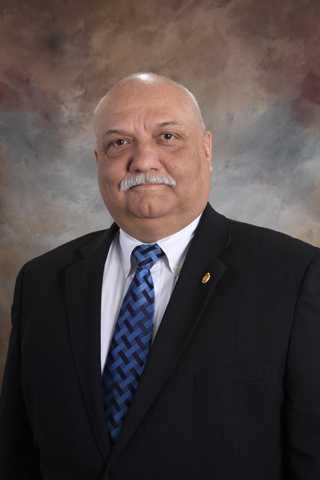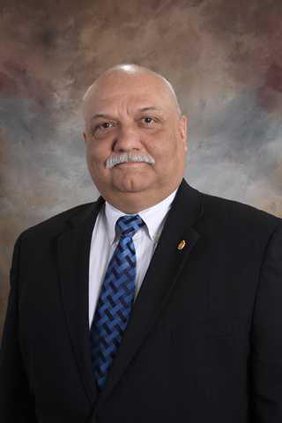Gene Wilson was appointed to the newly created position of public safety director for the city of Conyers in January and is now the acting Chief of the Conyers Police Department after Chief David Cathcart resigned.
What is your approach to law enforcement? What things do you value and what have you found effective over the years?
There are an awful lot of catch phrases out there. But I think honesty and integrity and key values to (law enforcement). You also have to have the humility to admit that maybe you made a mistake and you’re wrong. There’s nothing that says just because you have a badge and a gun that you’ll never make a mistake.
Why people pay taxes to have law enforcement in their communities, I think we’re here to keep the community safe and to serve the community. I think those are our priorities.
I think people, as they become supervisors and managers in a public safety environment, there seems to develop this concept of entitlement. In my opinion, the more responsibility you have in an organization, the more you have to work to hold your people and yourself accountable for what that responsibility requires.
This can be a very diverse job in a difficult environment. Sometimes the things you feel are the priorities, when you go out and talk to the citizens, are not their priority.
(For instance) we went out to talk to the home owners when there were a series of burglaries. But what they felt were priorities were speeding in their neighborhoods, speeding in their school zones, vandalism.
Our job is to educate on what is happening and to balance actual crime and the perception of crime and to develop the particular feeling that if you live in a particular jurisdiction, you are in fact as safe as you reasonably can be.
I think the thing that has impressed me the most is the quality of the staff in all areas of safety in city of Conyers.
Some of the things we need to work on are some team building and accountability in delivering the service.
Is there more restructuring coming down the line?
The restructuring we have done has been inside the police department. As we sit back and determine what our priorities and our strategies are going to be, I feel there is going to be some restructuring to help meet those priorities and strategies. I feel organizations have to be very flexible to help adapt to changing demands. I want to help adapt the police department to be more flexible and more adept and meeting the challenges we may encounter.
Having gone through an experience in the past where you resigned as chief from the Sandy Springs police, do you feel you know some of what (former CPD Chief) Cathcart might be going through?
Absolutely. David Cathcart, from everything I know about him and everything I’ve seen is a good and honest man with a great reputation. I don’t think there’s anybody that should have any different thought about David Cathcart.
What’s been the difference in living in the community where you work?
It’s been about 25 years since I have worked in the community where I live. I guess I’ve got some equity in what happens to the area. It gives me more time, the fact that I don’t have the long commute, to get some of the things done.
What leaders or experiences shaped how you lead and manage?
I think my experience with the DeKalb Police Department. I think Chief and later Director FD Hand Jr. had a real effect on the way that I manage. I think Chief Bobby Burgess had an influence on me. When I went to MARTA, there were many people there that helped me develop an understanding of people and society. I feel like I was lucky (to work with them).
(For instance) there was a board meeting at MARTA. It was a discussion over raising the fare. That was always a very contentious issue when we had to go through it. At the time this was being proposed, Dr. Joseph Lowery was the board chair. He had people in the audience stand up and challenge him about the fare increase and his thoughts and his dedication.
They were challenging who he was.
I’ve never been a really patient person, and I watched him, knowing what he had been through his life, but he never let them rattle him. He remained calm, he remained patient. I think some of that was his long history of being a minister.
For me, sitting there and hearing what was being said to him by people he had worked so hard for over the years, and to see that and see how he handled that with such poise, that impressed me. It really did. And I’m not known as being the most patient
person around.
How did you get into law enforcement?
At one time I thought I wanted to be a minister. Then I decided I wanted to be a history professor. I was down at Mercer at Macon and couldn’t afford that anymore. I started working and went to school at GSU, and got involved in the LEAP program. I took a criminal justice program as an elective, and it was like a light went on.
Any hobbies?
My wife and I both enjoy riding our motorcycle. My wife is a huge animal lover. She picks up strays everywhere. She stopped on I-20 in rush hour traffic to rescue a little dachshund. We have him now; his name is Lucky.
When we got married, I told my wife I wasn’t into having pets. Now, I think we have five dogs and I’m not sure how many cats that are officially ours, but there’s a fair amount. When my wife goes out to feed them, it looks like something out of a Walt Disney movie. Sometimes there’s a new one I hadn’t seen before. What I’ve learned is just don’t ask. Life’s good, just continue on.




